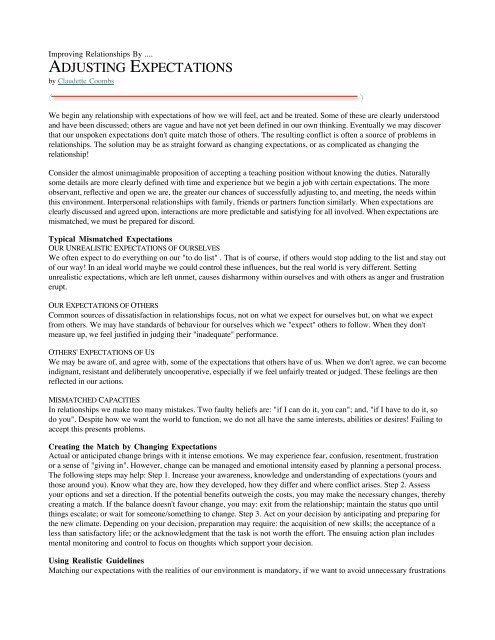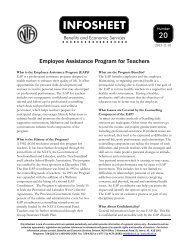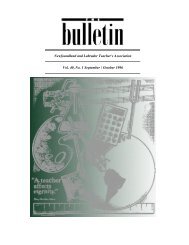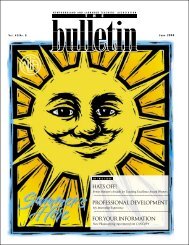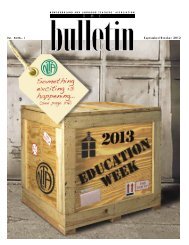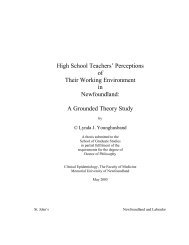Improving Relationships By ADJUSTING EXPECTATIONS by ...
Improving Relationships By ADJUSTING EXPECTATIONS by ...
Improving Relationships By ADJUSTING EXPECTATIONS by ...
You also want an ePaper? Increase the reach of your titles
YUMPU automatically turns print PDFs into web optimized ePapers that Google loves.
<strong>Improving</strong> <strong>Relationships</strong> <strong>By</strong> ....<br />
<strong>ADJUSTING</strong> <strong>EXPECTATIONS</strong><br />
<strong>by</strong> Claudette Coombs<br />
We begin any relationship with expectations of how we will feel, act and be treated. Some of these are clearly understood<br />
and have been discussed; others are vague and have not yet been defined in our own thinking. Eventually we may discover<br />
that our unspoken expectations don't quite match those of others. The resulting conflict is often a source of problems in<br />
relationships. The solution may be as straight forward as changing expectations, or as complicated as changing the<br />
relationship!<br />
Consider the almost unimaginable proposition of accepting a teaching position without knowing the duties. Naturally<br />
some details are more clearly defined with time and experience but we begin a job with certain expectations. The more<br />
observant, reflective and open we are, the greater our chances of successfully adjusting to, and meeting, the needs within<br />
this environment. Interpersonal relationships with family, friends or partners function similarly. When expectations are<br />
clearly discussed and agreed upon, interactions are more predictable and satisfying for all involved. When expectations are<br />
mismatched, we must be prepared for discord.<br />
Typical Mismatched Expectations<br />
OUR UNREALISTIC <strong>EXPECTATIONS</strong> OF OURSELVES<br />
We often expect to do everything on our "to do list" . That is of course, if others would stop adding to the list and stay out<br />
of our way! In an ideal world maybe we could control these influences, but the real world is very different. Setting<br />
unrealistic expectations, which are left unmet, causes disharmony within ourselves and with others as anger and frustration<br />
erupt.<br />
OUR <strong>EXPECTATIONS</strong> OF OTHERS<br />
Common sources of dissatisfaction in relationships focus, not on what we expect for ourselves but, on what we expect<br />
from others. We may have standards of behaviour for ourselves which we "expect" others to follow. When they don't<br />
measure up, we feel justified in judging their "inadequate" performance.<br />
OTHERS' <strong>EXPECTATIONS</strong> OF US<br />
We may be aware of, and agree with, some of the expectations that others have of us. When we don't agree, we can become<br />
indignant, resistant and deliberately uncooperative, especially if we feel unfairly treated or judged. These feelings are then<br />
reflected in our actions.<br />
MISMATCHED CAPACITIES<br />
In relationships we make too many mistakes. Two faulty beliefs are: "if I can do it, you can"; and, "if I have to do it, so<br />
do you". Despite how we want the world to function, we do not all have the same interests, abilities or desires! Failing to<br />
accept this presents problems.<br />
Creating the Match <strong>by</strong> Changing Expectations<br />
Actual or anticipated change brings with it intense emotions. We may experience fear, confusion, resentment, frustration<br />
or a sense of "giving in". However, change can be managed and emotional intensity eased <strong>by</strong> planning a personal process.<br />
The following steps may help: Step 1. Increase your awareness, knowledge and understanding of expectations (yours and<br />
those around you). Know what they are, how they developed, how they differ and where conflict arises. Step 2. Assess<br />
your options and set a direction. If the potential benefits outweigh the costs, you may make the necessary changes, there<strong>by</strong><br />
creating a match. If the balance doesn't favour change, you may: exit from the relationship; maintain the status quo until<br />
things escalate; or wait for someone/something to change. Step 3. Act on your decision <strong>by</strong> anticipating and preparing for<br />
the new climate. Depending on your decision, preparation may require: the acquisition of new skills; the acceptance of a<br />
less than satisfactory life; or the acknowledgment that the task is not worth the effort. The ensuing action plan includes<br />
mental monitoring and control to focus on thoughts which support your decision.<br />
Using Realistic Guidelines<br />
Matching our expectations with the realities of our environment is mandatory, if we want to avoid unnecessary frustrations
and improve relationships.<br />
Realigning the Match<br />
Despite the mismatches that may be part of daily interactions, this incongruity does not prevent satisfying relationships.<br />
In fact, enhanced understanding and mild readjustments in our thinking, followed <strong>by</strong> appropriate changes in our behaviour,<br />
can have a dramatic impact on our contentment and sense of well-being and may put relationships on track. It is never too<br />
late to examine personal expectations and observe how they are expressed in our behaviours. If we experience annoying or<br />
seriously disturbing conflict in a relationship, it is definitely time to take an inventory of expectations and compare the<br />
lists. Action can then be taken to understand each other's underlying needs and to establish new expectations which are<br />
better suited to the relationship.<br />
Eliminating the Match<br />
It is necessary to realize, however, that some conflicts are not caused <strong>by</strong> mild, or even moderate, differences in<br />
expectations. Sometimes the difference is more fundamental and conflict will always be present, as long as the relationship<br />
exists. When we recognize these fundamental incompatibilities, we have serious decisions to make and, at least short-term,<br />
unpleasant consequences ahead. One of the greatest causes of starting, or continuing, in mismatched relationships is poor<br />
communication. We tend not to clearly communicate our personal needs and our expectations of others. This leads to<br />
unspoken frustration and escalating resentment.<br />
<strong>Improving</strong> Information Exchange<br />
Unfortunately, we seem better able to make our expectations understood when dealing with students than in dealing with<br />
those closest to us. For example: we tell students "homework is due or else ..." but we rarely tell our partners "when I'm<br />
upset I want you to ...". When we understand what we want from ourselves and expect from others (a big task) and are<br />
ready to share that information with others (an uncommon skill), then we are setting the stage for informed<br />
decision-making. We can then continue to develop a relationship, based on reasonable and mutual expectations; or, we can<br />
end a relationship, based on a rational understanding of the existing incompatibilities. If this is not done early in a<br />
relationship, there is likely to be an accumulation of resentment because the partner is not meeting expectations. If this<br />
goes on too long, it may appear to be impossible to resolve the conflict.<br />
Points to Remember<br />
We cannot change others but may influence their thinking, which may lead to their decision to change.<br />
We are not responsible for the decisions of others.<br />
We are responsible for how we react to situations around, and within, us. We are also responsible for how we plan<br />
for anticipated events or situations.<br />
Emotional involvement is a natural consequence of unfulfilled expectations.<br />
Changing ourselves is a long and tedious process generally requiring significant reminders, strong motivation and<br />
plenty of patience –; why expect less of others<br />
Changing expectations should not prevent us from aiming for the stars or striving for perfection. However, it may<br />
prevent us from developing heart disease along the way as we (or others) fall short of achieving a goal or are<br />
reminded of our imperfection.<br />
Now that you are more familiar with your own expectations and those of your partner, family and colleagues, you may<br />
want to continue with improvements. Look for tips in my next article dealing with effective communications or contact<br />
me directly for more information on improving relationships.<br />
Claudette Coombs is an EAP Coordinator with the Employee Assistance Program for teachers. For confidential assistance contact<br />
Claudette Coombs (ext. 265), or Kathy Burford (ext. 242).


